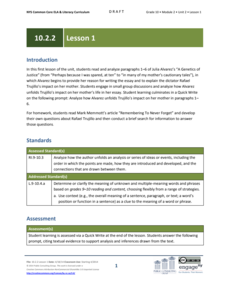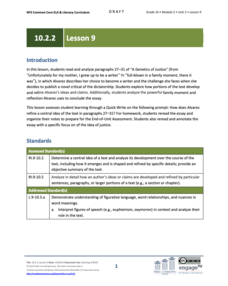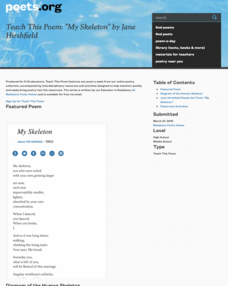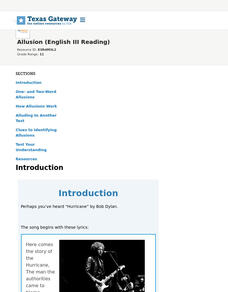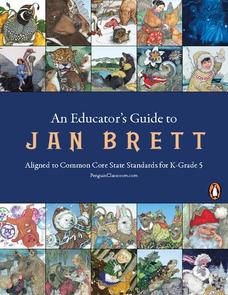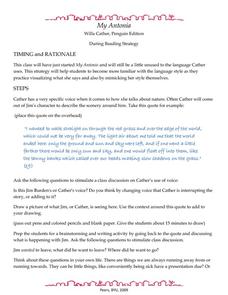Novelinks
Touching Spirit Bear: Question Answer Response Strategy
What types of questions help readers learn the most? Sixth, seventh, and eighth graders learn how to ask four types of questions from the Question Answer Response (QAR) reading strategy to help grow their comprehension of Touching Spirit...
EngageNY
Grade 10 ELA Module 2: Unit 2, Lesson 4
What does it mean to come undone? Scholars consider the author's use of the phrase as they read paragraphs 12–15 from Julia Alvarez's autobiographical essay "A Genetics of Justice." They complete a quick write to analyze how Alvarez...
EngageNY
Grade 10 ELA Module 2: Unit 2, Lesson 2
What is a megalomaniac? Scholars discover the word's meaning as they read and analyze paragraphs seven and eight from Julia Alvarez's essay "A Genetics of Justice." They also read Mark Memmott's article "Remembering to Never Forget" and...
EngageNY
Grade 10 ELA Module 2: Unit 2, Lesson 1
Rafael Trujillo was president of the Dominican Republic in the 1930s. Pupils read and analyze the first six paragraphs of Julia Alvarez's autobiographical essay "A Genetics of Justice," in which the author describes Trujillo's impact on...
EngageNY
Grade 10 ELA Module 2: Unit 2, Lesson 3
Does trauma have a lasting effect on people's lives? Scholars dive into the topic as they read paragraphs 9–11 of "A Genetics of Justice" by Julia Alvarez, in which the author describes her family's return to the Dominican Republic....
EngageNY
Grade 10 ELA Module 2: Unit 2, Lesson 6
How do authors use rhetorical devices and word choice to emphasize their ideas? Pupils consider the question while reading paragraphs 16–19 from Julia Alvarez's essay "A Genetics of Justice." Readers engage in evidence-based discussion...
EngageNY
Grade 10 ELA Module 2: Unit 2, Lesson 8
How do people's relationships with their parents impact their lives? Scholars read paragraphs 23–26 from "A Genetics of Justice" by Julia Alvarez, in which the author details her relationship with her mother. Pupils discuss how the...
EngageNY
Grade 10 ELA Module 2: Unit 2, Lesson 9
How do authors develop the main ideas in their writing? Pupils consider the question as they read and analyze paragraphs 27–31 from Julia Alvarez's essay "A Genetics of Justice," in which Alvarez describes her decision to become a...
EngageNY
Comparing and Contrasting Two Texts about Poison Dart Frogs: Eggs and Tadpoles
Poison Dart Frog babies are the focus of a lesson that challenges scholars to compare and contrast two informational texts. Beginning with a read-aloud, followed by a discussion, readers complete a practice page that examines the main...
EngageNY
Reading for Gist and Answering Text-Dependent Questions: Industrial Food Chain
Where do humans fall on the food chain? Scholars read about the Industrial Food Chain in The Omnivore’s Dilemma sections. They use word catchers to record unfamiliar words as they read and place sticky notes in the margins to annotate...
McGraw Hill
Study Guide for Frankenstein
Help the class uncover the story of Frankenstein. Learners answer questions and complete activities to respond to the text Frankenstein as they read. Scholars learn new vocabulary, respond to personal and text-dependent questions,...
Academy of American Poets
Teach This Poem: "My Skeleton" by Jane Hirshfield
Jane Hirshfield's poem "My Skeleton" asks readers to pause and think about the amazing, often taken-for-granted structure that protects and gives form to human bodies. After observing the human skeleton's image, class members read the...
National Endowment for the Humanities
Language Analysis Based on Stave 1
Class members meet the original scrooge, the Dickens character whose name has become synonymous with a cold-hearted, tight-fisted, miser. Using the provided worksheet, readers closely examine context clues to determine the meanings of...
Facing History and Ourselves
Picture This
Sometimes what you get is far more than what you first see. The third routine in the Building Community series asks participants to engage in a See, Think, Wonder strategy. Small groups analyze a projected image, infer what is happening,...
Core Knowledge Foundation
Unit 1: Hello, Universe by Erin Entrada Kelly Teacher Guide
Erin Entrada Kelly's award-winning novel, Hello, Universe is the anchor text in this 236-page teacher guide. The guide includes introductions to the Core Knowledge Language Arts (CKLA) program and the unit, a unit calendar, 12 lessons...
Curated OER
An Ideal for Which I Am Prepared to Die
English language learners have an opportunity to closely examine the academic language in portions of Nelson Mandela's famous 1964 Court Speech, "An Ideal for Which I Am Prepared to Die," with a lesson that looks at key passages from the...
Curated OER
Abigail as Political and Historical Observer
Lesson five in the series asks scholars to examine letters Abigail Adams wrote about her experiences during American Revolutionary War battles, her thoughts on slavery, and her concerns for her husband.
Texas Education Agency (TEA)
Allusion (English III Reading)
An interactive lesson introduces readers to allusions, the literary device writers use to add depth to their work. Users record notes on the provided graphic organizer as they identify the allusions in poems by Walt Whitman, Langston...
Texas Education Agency (TEA)
Annotating to Deepen Understanding (English III Reading)
An interactive resource teaches readers how to annotate all kinds of texts. After reading an introduction that stresses the benefits of text annotations, users examine several models and then demonstrate what they have learned by...
Penguin Books
An Educator's Guide to Jan Brett
Prepare to teach Jan Brett stories by taking a look at this teacher resource, which includes text-based questions, writing assignments, discussion ideas, and vocabulary practice for 18 different stories.
Pearson
Performance-Based Assessment Practice Test (Grade 7 ELA/Literacy)
Give your class a taste of the Common Core with a practice test that includes both literary and informational reading passages. Pupils respond to related multiple choice questions and longer written response questions. See the materials...
Curated OER
End-of-Year Practice Test (Grade 7 ELA/Literacy)
Prepare your pupils for Common Core testing with this practice test. The test includes one fictional text and four informational texts for learners to read and answer questions about. Also included are answer keys, an online version, and...
Curated OER
My Antonia: During Reading Strategy
Home in on the quote on this page to explore setting, the author's and character's voices, and plot in Willa Cather's My Antonia. Pupils draw a picture of what is described in the quote, discuss the content, and make connections to their...
Scholastic
Pilgrim and Wampanoag Daily Life for Grades 6–8
Two slide shows, viewed side-by-side, permit middle schoolers to compare and contrast the lives of the Pilgrims of the Plimoth colony and the Wampanoags. Four videos take learners on virtual field trips to the Plymouth plantation. And an...
Other popular searches
- Close Reading Passages
- Close Reading Activities
- Close Reading Exercises
- Close Reading Science
- Close Reading Drills
- Close Reading Tone
- Close Reading Camel
- Poem Close Reading
- Easter Close Reading
- Close Reading Passages Space
- Close Reading Ghost Towns
- Reading Close Procedure





